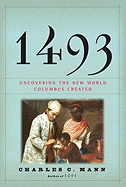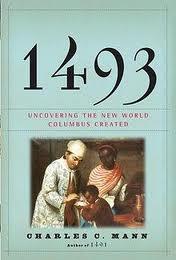
 In elementary school we were taught that Christopher Columbus landed on the Caribbean island of Hispaniola in 1492, the first stage in his plan to find a western route to China and circumvent the strangle-hold Venice, Genoa and Islamic nations had on the Silk Road. In this landmark book, Charles Mann (1491: New Revelations of the Americas before Columbus) refreshes our memories of those long-ago lessons, corrects many facts and amplifies our understanding. That voyage from Europe across the Atlantic Ocean turned out to be about more than simply opening an alternative route--it changed the world. Mann focuses on ecological and economic aspects of those changes.
In elementary school we were taught that Christopher Columbus landed on the Caribbean island of Hispaniola in 1492, the first stage in his plan to find a western route to China and circumvent the strangle-hold Venice, Genoa and Islamic nations had on the Silk Road. In this landmark book, Charles Mann (1491: New Revelations of the Americas before Columbus) refreshes our memories of those long-ago lessons, corrects many facts and amplifies our understanding. That voyage from Europe across the Atlantic Ocean turned out to be about more than simply opening an alternative route--it changed the world. Mann focuses on ecological and economic aspects of those changes.
Trade in tobacco and silver between the Americas and Europe provided the spur for what has come to be called the Columbia Exchange, yet the exchange involved much more: large domesticated animals (horses and oxen, the beasts of burden) arrived in North America; common nightcrawlers, red march worm and bees, not seen on the continent since the Ice Age, arrived in Virginia; mosquitoes that carried malaria and yellow fever were brought in from Africa, and so on. As scientist Cindy Hale told Mann, "Four centuries ago, we launched this gigantic unplanned ecological experiment. We have no idea what the long-term consequences will be." Though we can't predict how the experiment will end, Mann's eye-opening stories of what we have learned so far will rivet readers interested in the ecology of the planet and the starting point of globalization. Consider Mann's statement: "The industrial revolution depends on three raw materials: steel, fossil fuels, and rubber. If one member of that triad suddenly vanished, it would have unwelcome effect." Then, read about the leaf blight that decimated rubber plants in Brazil and begin worrying that it could spread elsewhere tomorrow.
Entrancingly provocative, 1493 bristles with illuminations, insights and surprises. Sweet potatoes from Africa came to China and averted a food crisis (and Malthusian limit to population growth); introduction of potatoes from the Andes had the same effect in Europe; and something called the Duffy antigen played a critical role in the slave trade. Mann portrays Mexico City as "a troubled, teeming, polyglot metropolis with an opulent center and seething ethnic neighborhoods... that is struggling to fend off ecological disaster" and sees it as the world's first 21st-century city, although it was already that way in 1642. Setting sail for China, Columbus started it all. --John McFarland
Shelf Talker: An eye-opening study of worldwide ecological changes brought about after Christopher Columbus first set foot on the land in the Caribbean.

